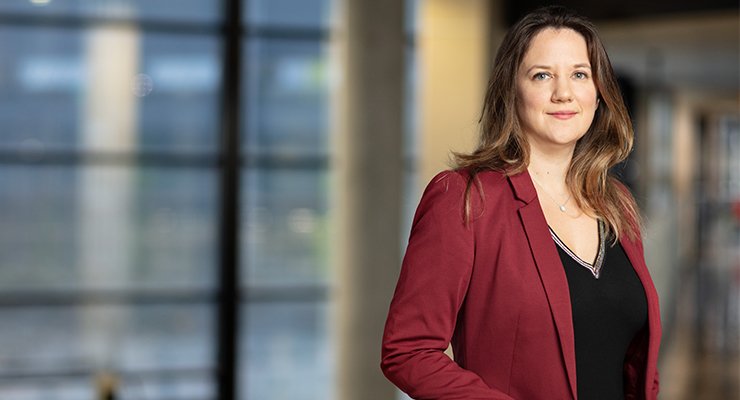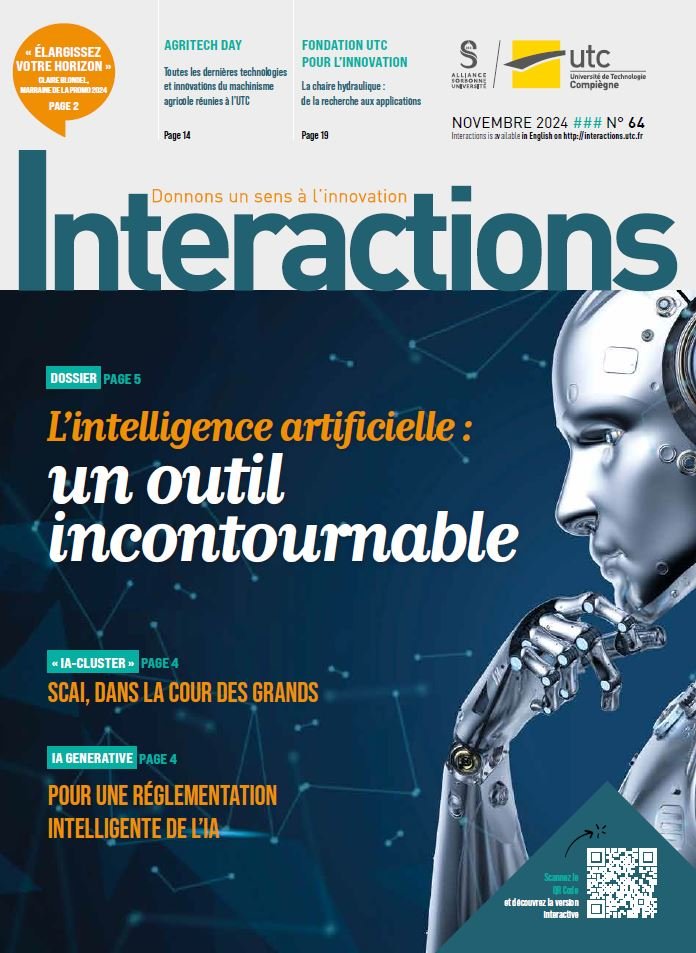Claire Rossi, a science passionaria

Professor Claire Rossi, was appointed Executive Vice-Chancellor & Director of UTC on December 8, 2022 for a five-year term of office.
Claire Rossi grew up in Lille; her mother who was an English teacher and later a national education inspector and her father who was a lecturer in law, then magistrate and deputy director of economic law at the French Ministry of Justice. Now 43 years of age and following suit to eight previous directors, she became the first female Director of the University of Technology of Compiegne 50 years after its creation. Concerning her school and academic career, Claire Rossi admits to a particular feature: “I went to school like everyone else until I was 10 years old, but then I was home-schooled, taking correspondence courses from the CNED. I liked what had supposed to be a temporary solution so much that I continued at home till my baccalaureate.
What did this experience bring her? “It provided lots of flexibility. I worked in shifts, mainly in the evening and even during part of the night. I was able to take courses at my own pace. I did, for example only maths one week, then physics another week and then chemistry. Working by block-studies had a real advantage: I was able to progress more quickly through the programme. This situation, which may seem somewhat disjointed, suited me well because it allowed me to work independently. In a way, it prefigured the work of a research scientist who has to know how to manage, adapt, etc.,” she says.
Didn’t this difference in relation to others restrict her social interactions? “Not at all. I took part in various activities such as music, theatre and sport. These activities allowed me to mix with all sorts of people, different cultures and different ways of thinking,” she says.
Did her relationship with science during these years? “I was passionate about science in general, physics and chemistry and especially palaeontology. From the start I wanted to become a researcher in this specialist field. My parents made enquiries and a researcher at the Museum of Natural History in Paris advised me to do a preparatory class to seek admission to Ecole nationale supérieure (ENS),” says Claire Rossi.
Determined, she followed this advice and signed up for a preparatory class. “But the preparatory class disappointed me, not so much because of the intense classroom rhythm but because of the overriding and pervasive curriculum cramming aspect. Where is the added value of a prep class teacher if in class he/she repeats for 2 hours what is in the textbook? The teacher must, in my opinion, offer a synthesis, a vision, a rhythm and above all teach students to think for themselves. This is what the lecturer-cum-research scientists at UTC do, for example,’ she explains.
This was certainly a disappointment, but it had the merit of giving birth to another passion: chemistry. This is how she was admitted to the Ecole nationale supérieure de Chimie de Toulouse, since renamed INP-ENSIACET. During her final year of engineering studies, she also completed an advanced diploma (DEA) in agroresources and was successful to do an internship at the Structural Biology Institute in Toulouse. “The world of research, the experiments carried out and the methodological construction of research were a revelation for me. So I looked for a thesis subject in France and found one at UTC with Professor Joël Chopineau, who announced six months later that he was going to set up a lab in the South. There were two alternatives: either I followed him but the lab didn’t exist yet, admittedly a bit risky. Or I could do it from a distance. Having the experience of autonomy and supported by the UTC-GEC team and Prof. Daniel Thomas, its director, I made the latter choice,” she explains.
Her thesis focused on ‘the interaction of a toxin from the pertussis bacterium with cells to determine how the toxin interacted with cell membranes and the different modes of insertion of this toxin’, she indicates.
After a post-doc at the Max Planck Institute for Polymer Research in Germany, Claire Rossi first came to UTC as a lecturer in 2007 and rose to the rank of university professor in 2016.
She has been a member of the UTC’s Board of directors since 2017, and from August 2020 was the interim Director of the university in the midst of a pandemic and lock-down. A period when the life of the institution was slowing down, as was the case in most other institutions, but “the machine did not stop for all that”, she says. When the new Director arrived in January 2021, she was asked to be his deputy, as she knew the university so well. When Christopher Guy left in August 2022, she once again naturally took over the duties of interim Administrator. The skills and vision she has shown during these two years have made her decide to take the plunge and run for the university’s top management post.
Restoring agility to UTC
Fully aware of her responsibilities, Claire Rossi details the projects she intends to undertake at UTC.
What is her vision of the UTC? ” UTC was created 50 years ago to bridge the link between society, companies, science and technology in order to meet the challenges of the day. It has developed several aspects: the adaptability of the students through modular training, high-level research in connection with the industry, territorial anchoring but also the international vista. In this respect, UTC was a pioneer establishment,’ she says.
In her opinion, this dynamic has somewhat run out of steam in recent years. Why? “There are, among other things, certain specificities of our school that have inspired and been copied by other establishments, but also the mode of growth that we have experienced. A layered growth which means that the agility of the early days has given way to more cumbersome processes which slow down innovation and creativity. We have to restore agility to UTC”, Claire Rossi advocates.
Faced with major challenges such as ecological and energy transitions but also the health issues of the near future, what role can UTC play? “To manage the coming crises, we will have to find solutions which do not exist yet. UTC, with its adaptive, modular training model, plus its agile and interdisciplinary research is, in my opinion, well equipped to answer these challenges. In fact, the fundamentals of the creation of UTC are still relevant. They just need to be updated so that we become a leading school in the creation of technological solutions by considering all approaches, and more specifically those that are sober, eco-responsible and sustainable, and that we do so in connection with the territory and the Nation’s priorities in the sector of green industries,’ she emphasises.
At a time when science and technology are more and more questioned, Claire Rossi wishes that the UTC reaffirms several aspects linked to its original values: a more interdisciplinary research at the service of a more sustainable future, an evolutionary training of the students, and to reopen itself more to companies.
More interdisciplinary research? “It will be a question of defining, with the laboratories and departments, strong cross-cutting strategic themes such as sustainable cities and mobility, the health of the future or digital transition and developing, beyond the disciplinary excellence that is already ours, a higher level of interdisciplinarity,” she asserts.
What about student training? “We need to strengthen the modularity and project-based training in which we are already excellent, in particular by encouraging the development and experimentation of new concepts by students over a longer period of time — one or even two years — during which they work on and test their concepts, the associate prototypes and underlying ideas. In a word: they should be actors in their own approach. Some of them will probably “break their teeth”. So they will have to learn to cope with failure but, above all, to bounce back,” she says.
A greater openness towards companies? “It will be a question of facilitating the interactions of research laboratories with companies so that companies take ownership of these strategic cross-cutting themes on which we will display our positioning. Thus, we must be able to propose innovative solutions to a company that submits a seemingly unfeasible project to us thanks to our new interdisciplinary vision,” Claire Rossi explains.
Other projects await her. “Among other things, we must display and make rapid progress on the institution’s commitment to sustainable development and social responsibility, further develop our international relations and partnerships in Europe, further strengthen our action within the Sorbonne University Alliance, our links with other universities of technology and work closely with local institutions,” she concludes.




